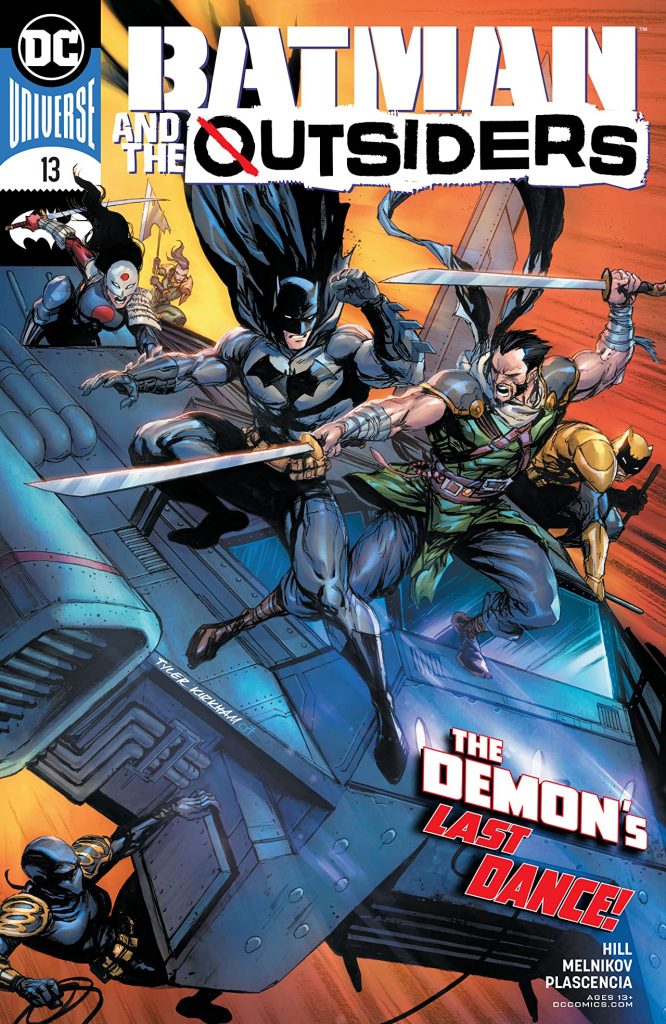 Overview: The stage is nearly set for the final confrontation with Ra’s al Ghul! But will the Outsiders be divided before the fight begins?
Overview: The stage is nearly set for the final confrontation with Ra’s al Ghul! But will the Outsiders be divided before the fight begins?
Synopsis (spoilers ahead): Batman brings in J’onn J’onzz a.k.a. Martian Manhunter to assist him and Black Lightning in learning about Ra’s al Ghul’s new alien technology. J’onn reveals that it landed from the stars in Markovia centuries ago, but was kept secret until Ra’s unearthed it. Batman believes that Jefferson can dig deeper into his power, and use his abilities to find and neutralize the technology. He presents to Jefferson a robotic seat for which to test his powers.
Katana and Shiva disagree on how to bring up Signal and Orphan. Shiva argues that the teens should be free to do what they want, but Katana believes that Shiva will lead them down a deadly path. They spar over the fate of their charges, which Katana quickly loses. Shiva takes Duke and Cassandra to her loft where she asks the two of them what they feel they need to do, which they both agree is stopping Ra’s.
Analysis: Right up front it must be said that Gleb Melnikov is a welcome new artist for this book. Dexter Soy was no slouch, but he never really sold any emotion other than stringent stoicism. Melnikov goes in the other direction, where the characters look less serious, less stressed, and more charismatic. It’s a style that recalls Chris Bachalo in its dynamic, cartoony quality, but a book with this many characters needs a style that can give those characters more personality. In the scene where Duke and Cass are sparring, they’re smiling the entire time. It goes to show that they’re truly friends, which does more than just implying that by having them hang around each other every issue. Cass loves to fight and Duke enjoys watching Cass fight. I also liked the fashion Melnikov gave the two and Shiva in the scene in her rented loft. They were all pretty dressed up, but the added style made for an issue that was very easy on the eyes.
That’s the extent of the talking points for #13, as this is just more stage setting. Hill’s dialogue is still delivered in declarative statements over reflexive dialogue that doesn’t really mirror conversational speech, and after several months I can only keep mentioning that so many times before it’s no longer a talking point. His writing isn’t bad, but it’s very stilted. The scene with Batman and Black Lightning, in the beginning, has the two ping-pong dialogue off of each other warily, with tension filling the space between word balloons in a way that feels like it’s meant to carry more weight than is there. Every issue has had Bruce and Jefferson match wits, mostly with the same emotion. Shouldn’t their relationship have developed further beyond this point? Maybe not, since not much action has happened since before the battle in Cambodia.
I do wonder if Hill is putting a lot of his seeds towards ending this title soon. The emotional story is the development and liberation of Signal and Orphan, while Black Lightning never listens to Batman and Katana plays den mother to everyone. Tony Isabella famously decried BL’s subordinate status as a part of Batman’s team, and I wonder if this is what Hill had in mind for his story all along or if any of this is a reaction to him or other fans of the characters. So far it works, especially if you’re a Cass Cain fan. (A nice moment was when Shiva referred to Cass as “Orphan” in quotations.) There doesn’t seem to be a lot of stated confidence in the future of this team, which is just as well, as there’s been more downtime than the five of them working together. We’ll see how things turn out soon enough.
Final Thoughts: This issue feels like more of the same as the previous one, but the change in artists made this more fun to read.
Editor’s Note: DC Comics provided TBU with a copy of this comic for review purposes. You can find this comic digitally and help support TBU in the process by purchasing this issue through Comixology.
